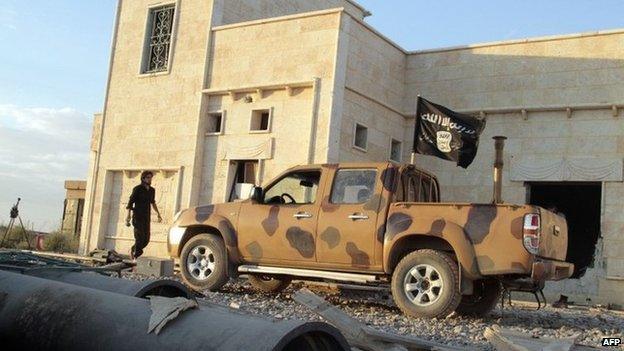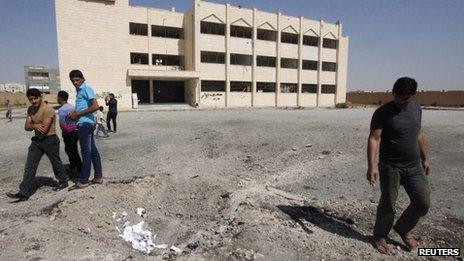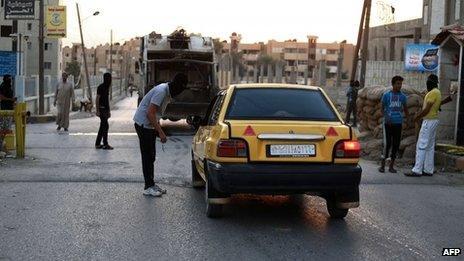Al-Qaeda's brutal tactics in Syria force out moderates
- Published

"I was handcuffed, blindfolded when I was taken to their base. Like the six other detainees with me, we were whipped 70 times every day."
"We were mostly accused of setting up 'Sahwa' - Awakening Councils - against the state."
Mohammed's horrific tale of torture from Syria might not sound that unusual if the "state" his captors' were referring to was the government of President Bashar al-Assad.
But they were from the self-proclaimed Islamic State of Iraq and the Levant (ISIS), an al-Qaeda affiliate that has become an equally feared force in rebel-held areas.
'New dictatorship'
Mohammed, an engineer in his early 50s who is the father of four children, joined the peaceful protest movement against Mr Assad when the uprising in Syria began in 2011.
When Raqqa province fell under rebel control, he helped set up a local council to provide basic services in the absence of the state.
Activists who've fled Raqqa have been talking to BBC Newsnight
But little did they know that it would not take long for a new dictatorship to replace the one from which they had freed themselves.
On 9 July 2013 - the first day of the Islamic holy month of Ramadan - Mohammed and six other members of the council in the border town of Tal Abyad were detained by members of ISIS, who handcuffed and blindfolded them and took them to the city of Raqqa.
Over the next 33 days, Mohammed was tortured on a daily basis by the jihadists.
But even after his release, Mohammed was not safe. He soon learned that his life was at risk and so fled north by foot to Turkey.
He is now staying in Gaziantep, attempting to ensure safe passage for his wife and children so that they can start a new life together, away from Syria.
'Kafir'
Sitting in a flat in the city that has become home to many other refugees, Mohammed is filled with bitterness as he describes how he believes the revolution in his country has been hijacked by extremist groups that do not represent Syrians.
"They are mostly foreigners coming to impose their ideologies on us," he says in a low, calm voice.
Mohammed is a non-practising Muslim who believes that Syria should continue to be a secular state, and that religion is a private issue.
That stance, however, was enough to prompt ISIS to declare that he was a "kafir" - a non-believer - who deserved to be punished.
The group has used such designations to force out moderates in areas under its control, whether they are local councillors, opposition activists or even fellow rebels.
'Shadow emirs'
But Mohammed says the jihadists' extremist ideology is not the only reason for doing that. He claims they are working with the government to undermine the rebellion.
"[In Raqqa], they have occupied the governor's house and other former Baath Party buildings. But when the city comes under bombardment, only schools, hospitals and residential areas are hit, and not any ISIS-occupied locations," he says.

Mohammed said the government targeted Raqqa's schools - not its ISIS bases
Mohammed says ISIS is led by a mixture of Syrian and foreign "emirs", and that 11 of the Syrians were detained at Saydnaya military prison in southern Damascus before the uprising began in March 2011. They were released, along with many other Islamists, the next month when President Assad issued a general amnesty, he adds.
"The Syrians were practicing on us the same methods of torture they were subjected to in prison," Mohammed says.
"But the power lay with the 'shadow' emirs - Iraqis and Tunisians, mainly. They were the ones beheading people and imposing an extremist interpretation of Islam that is not even accepted by religious people in Syria."
"They never pray nor fast, but they force us to do so and they claim they want an Islamic state," he adds.
'Tortured to death'
Mohammed recalls how two brothers were detained by ISIS fighters in Raqqa and then killed - one was tortured to death; the other shot in the head - simply because they were members of President Assad's minority Alawite sect.
"They had been living in Raqqa for years and were part of the revolution," he says. "When different [rebel] brigades captured the town, they obtained documents from them to prove that they were not spies for the regime."

Raqqa was the first Syrian city to be controlled entirely by rebel forces
"But those documents - including one from the [al-Qaeda affiliated] al-Nusra Front - didn't protect them from ISIS."
Mohammed also says a heating oil merchant, Abu Wael, was tortured after refusing to sell any at a discounted rate to members of ISIS. He apparently told them that he had agreed a price with their emir, but they demanded it be halved.
One night, he was detained and then tortured for six consecutive days.
"His shirt was so embedded in his flesh [from the flogging] that I had to push my finger deep into the wounds to pull out the material," Mohammed says.
"We managed to convince them later to transfer the remainder of his punishment to us, and we received 70 lashes a day to save him from more torture."
A judge at a Sharia court later ruled that Abu Wael had been wrongly detained and punished, and ordered his release. It is not known if he is still alive.
But Mohammed has not lost hope. Though he is trying to bring his family to Gaziantep, he is determined to return to Syria eventually.
"I have faith in the people, who revolted against tyranny that lasted for 50 years, to revolt against an al-Qaeda import that is not welcome in Syria."